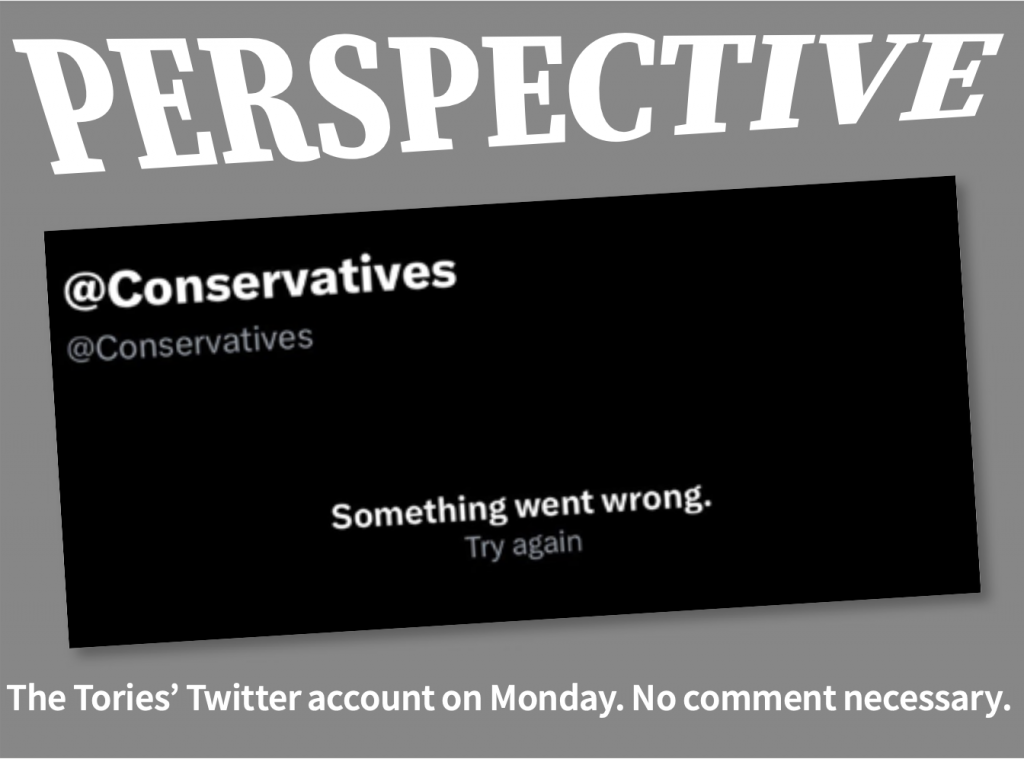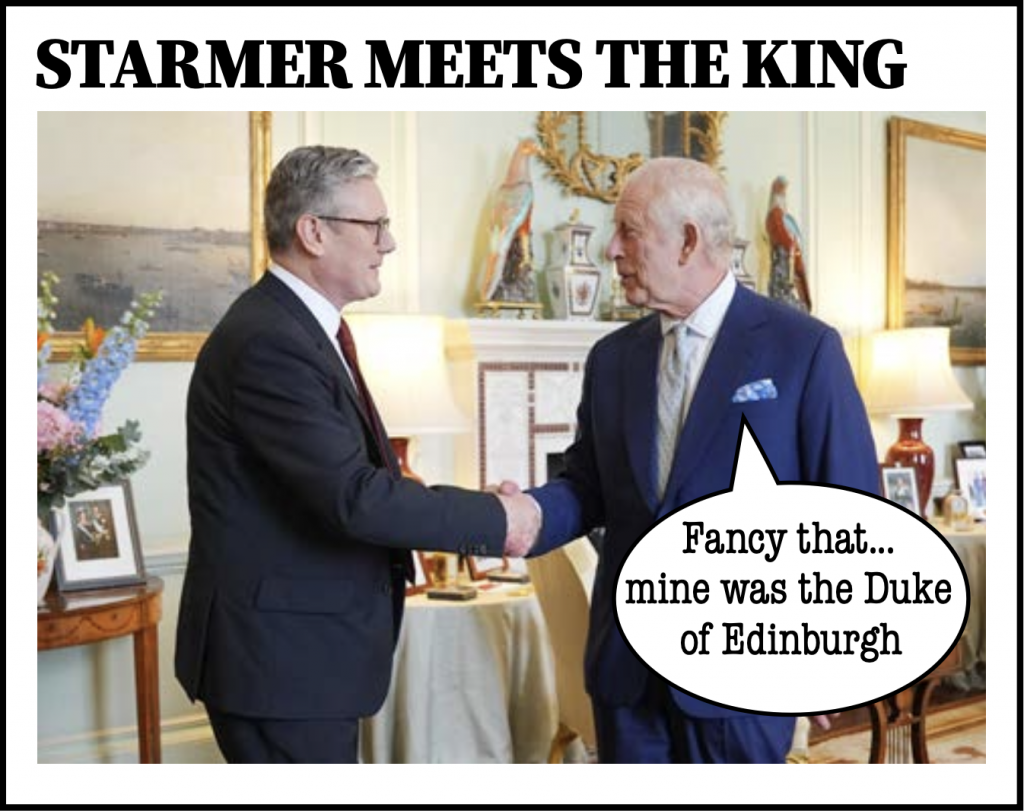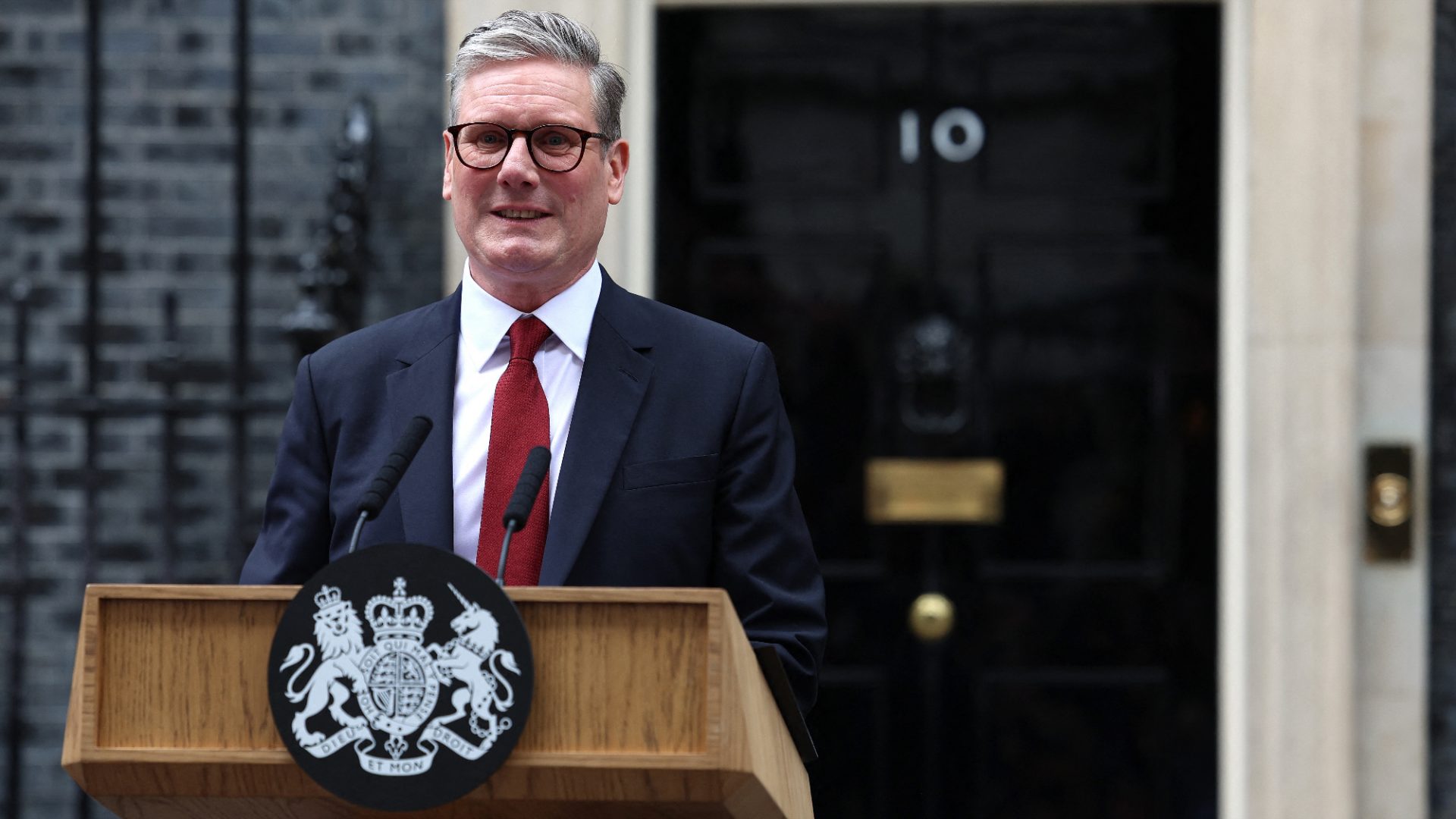“OK, now get on with it” says the headline of your election special (TNE #395), with a photo of Keir Starmer.
It’ll be an uphill struggle as long as he fails to address the blue whale (surely by now it has grown well out of elephant size) in the room. He won’t be able to “get Brexit to work”.
Eivind Kaisen
Just because some of the Brexit cheerleaders have been booed off the stage, the myths of the monumental act of self-harm will continue to be peddled – witness Boris Johnson’s absurd claim about “serfdom” if we align more with the EU over trade.
Keir Starmer has made a good start, saying most of the right things, given the mess the country is in. Nearly all of his pledges depend on growing the economy, which means improving our productivity, diversifying our products, and trading competitively (ie without non-tariff hindrances) with our closest neighbours. Trying to do that outside the single market is like putting out a five-a-side team at the Euros with their legs tied together.
It’s not just about ever-closer alignment with the EU as a trading partner. We desperately need much better productivity, so look at most EU countries’ vocational training systems, the quality of their apprenticeships, look at successful EU companies’ recruitment and retention strategies, their internal and external investment plans, the number of employees in their boardrooms, their quality assurance processes.
Reform the NHS, recruit more teachers, transform social care, regenerate disadvantaged communities, eradicate child poverty… yes, please. But outside and at a sovereignly safe distance from the EU? Not a chance!
Rex Nesbit
The sad thing is all the pain that the most vulnerable in society will endure because Labour will not be honest about what is needed. Without joining the customs union, there won’t be any significant economic improvement.
I’m very concerned that Labour may only get a single term. However, in the long run that may be for the best, as a future hung parliament could usher in electoral reform.
Mark Cowling
I was impressed with Starmer’s down-to-earth pragmatism in his first press conference. I would surmise he will be patient but exacting, and this willingness for hard graft will, I think, go down well with the public, who have had more than enough of Tory psychodrama.
Once they become accustomed to his non-flashy type of operation, his aims will become apparent. Tom Baldwin (“Can Starmer get it done?”, TNE #395) is correct that his modus operandi can seem elliptical, but the bottom line is, he will be a prime minister for action and results, rather than endless pontificating about it.
What you see is what you will get, not a showman or a kamikaze gambler prime minister, just a straight-down-the-line mover and shaker, but in his own individual style of operation.
Judith A Daniels,
Cobholm, Norfolk

Jacob’s up the creek
Re: Your election coverage. I look forward immensely to the BBC’s forthcoming series with Jacob Rees-Mogg travelling around the country’s ancient byways on a penny farthing.
John Dallimore
I presume the Oxford English Dictionary will be updating its definition of “landslide victory” to “a term applied to an election victory in which a significant majority of seats are won by a political party when over 60% of the electorate do not vote for that party”.
Chris Fitzpatrick
Dublin, Ireland
Media misinformation
Re: Liz Gerard’s piece about the election as covered in the right wing media. It is hardly surprising, given the volume and intensity of misinformation pumped out routinely by our erstwhile leaders, that people have become suspicious of politicians.
The media plays an important part in the erosion of trust. The right wing print media has routinely misrepresented events, especially Brexit, to the point where its exhortations have become ludicrous – look at any Daily Mail headline (other examples are easily available, in the interests of balance). As the claims have become ever more obviously mad – supporting Truss, for example – people have stopped paying attention.
Thus the media faces the proposition that its influence is massively diminished from earlier times, when the Sun could claim to have won an election. And, as the media’s influence has declined, so the Conservatives are left without a reliable cheerleader. Grindingly embarrassing attempts at influencing on TikTok simply illustrate how out of touch the attempt to communicate is.
It is a very new age we enter, with honest journalism at a premium. As the right sees its domination of the print media have less and less effect, alternative methods of persuasion will have to be adopted, as we have seen with GB News.
Whatever the rights and wrongs of the electoral system adopted, any democracy can only function with reliable information being provided easily to the electorate. The greatest danger to our democracy lies in the lack of such sources (who can afford to back them?) and the threat of how the right responds to this recent landslide.
PM
Ipswich, Suffolk
Another country
As a lifelong advocate of Scottish independence I was, of course, dismayed by the hammering dished out to the SNP on July 4. However, I quickly cheered up as it sank in that the Tories have been destroyed for the foreseeable future.
The analogy that sprang to mind was the overnight hosing down of Paris streets, leaving them fresh and clean in the morning. The image of Johnson, Truss, Rees-Mogg et al being swept along in the gutter was irresistible.
The SNP have time, before the 2026 Holyrood election – by which time Labour’s honeymoon will be over – to get a grip and show the Scots (around 50% of whom still favour independence) that it is pointless to turn the Scottish parliament red too; that would only mean an undemocratic Labour hegemony, stifling opposition. Scotland is a different country.
David Roche
Blairgowrie, Perthshire
As the first past the post system delivers another lurch in the political system, it’s important not to misinterpret results as the Tories did in 2019, attributing Johnson’s very large majority to his brilliance and not – as was more accurate – the public’s weariness of Brexit and a leader in Jeremy Corbyn entirely unpalatable to the vast majority of the country.
The SNP lost a number of good MPs whose hard work and dedication is in no way reflected in the results. More painfully, East Lothian, for example, has gained a Labour MP in Douglas Alexander who was one of the main architects of the illegal invasion of Iraq – the rest is, as they say, history.
Amanda Baker
Edinburgh, Scotland
School of thought
Amelie Baker’s prescient lament (“Us and Them”, TNE #395) could not be more true or depressing! Politics in schools is very thinly spread, hence the widespread political illiteracy among our youth.
How many secondary schools, state or private, will have had the courage to suspend their humanities programmes for the upper age range in order to concentrate on the mechanics and issues of this election, and appreciate last week’s excitement?
Before the straitjacket of the national curriculum, this was possible and not uncommon.
Any consideration of reducing the voting age to 16 should go hand in glove with the consideration of what needs to be taught in schools to justify the change.
David Handley
Gargrave, Yorkshire
Voting restrictions
I disagree with Chris Bliss-Jones (Letters, TNE #395) that expats should lose their UK vote after five years abroad.
I live in Spain (I refer to myself as an immigrant rather than an expat). I pay taxes here, but remain a British citizen. I voted Remain, do not vote Tory and take exception to Chris’s generalisation about people who have left the UK. Yes, some people living abroad did vote for Brexit and will have voted Tory, but a far smaller percentage than those who voted for both who reside in the UK.
If there should have been any discrimination over voting in the past, maybe it should have applied to the referendum – excluding those over 70 as it was not their future, and Brexit continues to restrict opportunities for the younger electorate.
I am glad that Labour has promised to lower the voting age to 16; let us hope they do not renege on this promise.
Lesley Gibson-Meredith
Orihuela, Spain
In response to Jessica Lionnel’s piece “The expat life loses its appeal” (TNE #395) I am sure I am not the only one who bristles at that term. Why is it when Brits leave to live as foreigners in other people’s countries they are referred to by the more cuddly term “expats”, but when people from those countries come here they are foreigners and immigrants?
On the wider point, we have only a limited idea how many there are of these British expats around the world with a full British passport and hence the right of return any time they like. It is likely to be a number of millions. Some of those will trickle back over time, sometimes old, sick and with nowhere immediately to live.
However, a major geopolitical event across continents might well prompt a mass return of people to the UK, and a responsible government should have some idea of what those numbers might be.
Bob Hale
Bristol
Lingering long
As always, Peter Trudgill’s piece “The long and the short of it” (TNE #395) was erudite and interesting.
Yet his statement: “other diminutive suffixes in English, such as […] -ing as in duckling […]” is slightly misleading. The suffix in question is not -ing (gerund) but -ling. Further examples include sapling, yearling and starling.
The same suffix appears in some German words, such as Liebling (darling) and Jüngling (youth).
Rodney Mantle
Twickenham, Greater London
I was surprised to read in Peter Trudgill’s column “Hello from the other side” (TNE #394) that “the first unambiguously British citation of ‘hi’ in the OED does not appear until 1953”.
There was a BBC radio series called Hi Gang!, which ran from 1940 to 1949, conceived by Ben Lyon and his wife, Bebe Daniels, as a morale-booster for wartime audiences. It was almost as popular as It’s That Man Again.
Maybe the fact that Ben and Bebe were US citizens makes the 1940s British adoption of the word “ambiguous” from the OED’s standpoint? The couple were undoubtedly Anglophiles, as they lived in London until Bebe’s death in 1971.
I would also bet that with so many US servicemen in Britain during the war the use of “Hi” became quite common, along with such phrases as “got any gum, chum?”, often quoted as being used by children, who knew the Americans were likely to have chocolate and chewing gum.
Geoff Sherratt

BELOW THE LINE
Comments, conversation and correspondence from our online subscribers
Re: Nigel Warburton on prison (TNE #395). Incarceration should be a last resort, a way to keep the criminally insane from committing harm on the general public. Jail time achieves nothing for less serious offenders, indeed there is plenty of evidence to suggest it only exacerbates criminal intention and behaviours. Rehabilitation is the key, with the sword of Damocles, in the form of an even stricter punishment, hanging over criminals not willing to meet strict redemptive criteria.
David Combs
Re: Alastair Campbell on the Biden-Trump debate (TNE #395). If you read the transcripts, you will see that Biden made sense and Trump didn’t.
Biden’s voice was soft and raspy as he had a cold. He was clearly over-prepped on factoids. And the lighting favoured Trump’s over-bronzed face.
But even on life support, he’d be 1000x better than Trump.
Kamala Harris is the only person the Democrats could change to – the money raised so far is for the Biden/Harris campaign.
Lauren Smith
Re: “A conspiracy of silence” (TNE #395). For many years I’ve considered FPTP a terrible thing, but in this instance, it has been our protection from a truly awful situation where Reform “should” have received about 80 seats, and might have formed a coalition government with the Conservatives… campaigners for proportional representation, be careful what you wish for.
Ross Hamilton
Starmer could exemplify change by recognising that our electoral system is terminally ill. He should show humility that he has gained an obscene majority from less than 25% of eligible voters. It leaves Reform voters feeling marginalised, just what the far right like to dine out on.
He should establish a sophisticated consultative process to come up with a fairer electoral system and put it in place before the next election.
Jonathan Fogey
On the TNE website, Steve Anglesey argues that if Nigel Farage demands another referendum on PR he should naturally agree to another on Brexit. That seems naive. Logic plays no part with Farage. The “great opportunist” is perfectly capable of supporting two contradictory views at the same time.
David Howells
JOIN THE CONVERSATION
Subscribe and download our free new app to comment and chat with our writers



